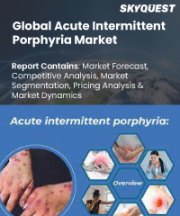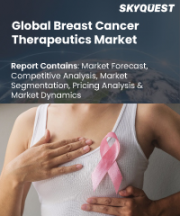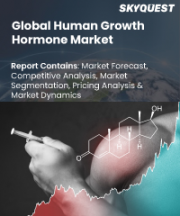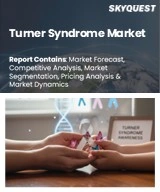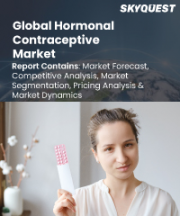
|
시장보고서
상품코드
1755919
난포 자극 호르몬 시장 예측(-2032년) : 제품 유형, 투여 경로, 유통 채널, 용도, 최종 사용자, 지역별 분석Follicle Stimulating Hormone Market Forecasts to 2032 - Global Analysis By Product Type (Recombinant FSH and Urinary FSH), Route of Administration, Distribution Channel, Application, End User and By Geography |
||||||
Stratistics MRC에 따르면, 세계의 난포 자극 호르몬 시장은 2025년 26억 달러를 차지하고 예측 기간 동안 CAGR 6%로 성장해 2032년에는 39억 달러에 이를 것으로 예측됩니다.
난포 자극 호르몬(FSH)은 뇌하수체 전엽에 의해 생산되는 당 단백질 호르몬입니다. 여성에서는 난소, 남성에서는 고환의 성장, 개발, 기능을 조절하여 생식 건강에 중 중요한 역할을 수행합니다. 여성에서는 난포의 성숙을 자극하고 남성에서는 정자 형성을 촉진합니다.
2023년 4월에 갱신된 세계보건기구(WHO)의 데이터에 따르면, 전 세계적으로 성인의 약 6명 중 1명이 불임증을 앓고 있습니다.
불임 치료에 대한 인식과 수용 증가
세계의 불임률 증가와 체외수정(IVF) 등의 고도 생식 의료 기술에 대한 지식의 향상으로 효과적인 불임 치료법에 대한 수요가 높아지고 있습니다. 이와 같은 인식에 의해 보다 많은 환자가 치료를 받게 되어, 시장의 성장을 뒷받침하고 있습니다. 또한, FSH의 생산 및 전달 방법에 있어서의 기술적 진보가 치료 성적을 향상시켜, 시장의 확대를 뒷받침하고 있습니다.
부작용과 안전에 대한 우려
FSH 치료와 관련된 부작용과 안전성에 대한 우려는 시장 성장의 과제가 되고 있습니다. FSH 요법을 포함한 불임 치료에는 고액의 비용이 들기 때문에 특히 보험이 적용되지 않는 저소득 지역에서는 접근이 제한됩니다.
제품 혁신과 바이오시밀러
첨단 재조합 DNA 기술로 개발된 재조합 FSH 제제는 소변 유래 호르몬에 비해 순도와 일관성이 높고, 유효성과 안전성이 향상되고 있습니다. 또한 프리필드 주사기와 펜 유형 주사기와 같은 약물전달 시스템의 혁신은 환자의 편의성과 컴플라이언스를 향상시키고 시장 성장을 더욱 자극합니다.
윤리적·종교적 우려
윤리적, 종교적 우려는 FSH 시장에 큰 위협이 되고 있습니다. 이런 우려는 일반 대중의 인식에 영향을 주어 특정 지역에서는 규제를 제한하는 정책으로 연결되어 시장 침투를 제한하게 됩니다.
COVID-19의 영향:
COVID-19의 유행은 주로 체외수정(IVF)을 포함한 긴급성이 없는 불임 치료의 중단을 통해 FSH 시장을 혼란시켰고, 많은 나라에서 평균 2개월 가까운 지연을 일으켰습니다. 또한 공급망의 중단으로 약물의 입수가 늦어졌습니다.
예측 기간 동안 재조합 FSH 부문이 최대가 될 전망
유전자 변형 세포주를 이용한 재조합 DNA 기술에 의해 달성되는 뛰어난 순도, 일관성, 생물활성에 의해 재조합 FSH 부문은 예측 기간 중 최대 시장 점유율을 차지할 것으로 예측됩니다. 야생 성장은 보조생식기술 기술과 불임 치료의 세계 도입 증가에 의해 더욱 지원되고 있습니다. 또한, 현재 진행중인 연구 개발 노력에 의해 유전자 재조합 FSH 제제의 개량이 계속되고 있어, 불임 치료에 있어서의 바람직한 선택으로서의 지위를 확고한 것으로 하고, 최대 시장 점유율에 기여하고 있습니다.
주사제 부문은 예측 기간 동안 가장 높은 CAGR이 예상된다.
예측 기간 동안 난소 자극과 같은 불임 치료에 널리 사용되는 주사제가 가장 높은 성장률을 보일 것으로 예측됩니다. 주사기구의 진보로 환자의 편의성과 컴플라이언스가 향상되고 있습니다.
최대 공유 지역:
예측 기간 동안 북미는 고급 건강 관리 인프라, 불임 및 불임 치료에 대한 높은 인지도, 보조생식기술 기술에 대한 유리한 상환 정책으로 인해 최대 시장 점유율을 차지할 것으로 예측됩니다. 또한 불임증의 높은 유병률, 불임 치료 클리닉과 전문센터 증가도 견조한 수요를 뒷받침하고 있습니다.
CAGR이 가장 높은 지역:
예측 기간 동안 아시아태평양은 불임률 증가, 가처분 소득 증가, 건강 관리 인프라 확대로 가장 높은 CAGR을 나타낼 것으로 예측됩니다. 프로덕티브 헬스(생식에 관한 건강)를 개선하기 위한 정부의 이니셔티브이 수요 증가에 기여하고 있습니다.
무료 주문을 받아서 만드는 서비스:
이 보고서를 구독하는 고객은 다음 무료 맞춤설정 옵션 중 하나를 사용할 수 있습니다.
- 기업 프로파일
- 추가 시장 기업의 종합적 프로파일링(3개사까지)
- 주요 기업의 SWOT 분석(3개사까지)
- 지역 세분화
- 고객의 관심에 응한 주요국 시장 추계, 예측, CAGR(주: 타당성 확인에 따름)
- 경쟁 벤치마킹
- 제품 포트폴리오, 지리적 존재, 전략적 제휴에 기반한 주요 기업 벤치마킹
목차
제1장 주요 요약
제2장 서문
- 개요
- 이해관계자
- 조사 범위
- 조사 방법
- 데이터 마이닝
- 데이터 분석
- 데이터 검증
- 조사 접근
- 조사 자료
제3장 시장 동향 분석
- 성장 촉진요인
- 억제요인
- 기회
- 위협
- 제품분석
- 용도 분석
- 최종 사용자 분석
- 신흥 시장
- COVID-19의 영향
제4장 Porter's Five Forces 분석
- 공급기업의 협상력
- 구매자의 협상력
- 대체품의 위협
- 신규 참가업체의 위협
- 경쟁 기업간 경쟁 관계
제5장 세계의 난포 자극 호르몬 시장 : 제품 유형별
- 재조합 FSH
- 순수 재조합 FSH
- 혼합 재조합 FSH 제형
- 요중 FSH(uFSH)
제6장 세계의 난포 자극 호르몬 시장 : 투여 경로별
- 주사제
- 기타 경로
제7장 세계의 난포 자극 호르몬 시장 : 유통 채널별
- 병원 약국
- 소매 약국
- 온라인 약국
- 전문 약국
제8장 세계의 난포 자극 호르몬 시장 : 용도별
- 보조생식기술(ART)
- 체외수정(IVF)
- 난세포질내정자주입법(ICSI)
- 성선기능저하증
- 배란유발
- 기타 용도
제9장 세계의 난포 자극 호르몬 시장 : 최종 사용자별
- 병원
- 불임치료클리닉 및 불임치료센터
- 연구기관 및 학술센터
- 기타 최종 사용자
제10장 세계의 난포 자극 호르몬 시장 : 지역별
- 북미
- 미국
- 캐나다
- 멕시코
- 유럽
- 독일
- 영국
- 이탈리아
- 프랑스
- 스페인
- 기타 유럽
- 아시아태평양
- 일본
- 중국
- 인도
- 호주
- 뉴질랜드
- 한국
- 기타 아시아태평양
- 남미
- 아르헨티나
- 브라질
- 칠레
- 기타 남미
- 중동 및 아프리카
- 사우디아라비아
- 아랍에미리트(UAE)
- 카타르
- 남아프리카
- 기타 중동 및 아프리카
제11장 주요 발전
- 계약, 파트너십, 협업, 합작투자
- 인수와 합병
- 신제품 발매
- 사업 확대
- 기타 주요 전략
제12장 기업 프로파일링
- Ferring Pharmaceuticals
- Merck KGaA
- Pfizer Inc.
- Teva Pharmaceutical Industries Ltd.
- Allergan plc
- Ipsen Pharma
- LG Chem Ltd.
- Asarina Pharma
- Intas Pharmaceuticals Ltd.
- Bharat Serums and Vaccines Ltd.
- Sun Pharmaceutical Industries Ltd.
- Gedeon Richter Plc.
- Sandoz International GmbH
- BioTech Pharmacal
- Fuji Pharma Co., Ltd.
- Lupin Limited
- Geneo Pharma
- Fidia Farmaceutici SpA
According to Stratistics MRC, the Global Follicle stimulating Hormone Market is accounted for $2.6 billion in 2025 and is expected to reach $3.9 billion by 2032 growing at a CAGR of 6% during the forecast period. Follicle Stimulating Hormone (FSH) is a glycoprotein hormone produced by the anterior pituitary gland. It plays a crucial role in reproductive health by regulating the growth, development, and function of the ovaries in females and the testes in males. In women, it stimulates ovarian follicle maturation; in men, it promotes spermatogenesis. FSH levels are often measured to assess fertility, menstrual irregularities, or pituitary function.
According to the World Health Organization (WHO) data updated in April 2023, approximately 1 in 6 adults globally are affected by infertility.
Market Dynamics:
Driver:
Growing awareness and acceptance of fertility treatments
Increasing infertility rates globally, coupled with enhanced knowledge about advanced reproductive technologies such as IVF, have led to a rising demand for effective fertility solutions. Additionally, expanding healthcare infrastructure, including fertility clinics and specialized centers, supports greater accessibility to FSH therapies. This awareness encourages more patients to seek treatment, driving market growth. Furthermore, technological advancements in FSH production and delivery methods improve treatment outcomes, reinforcing market expansion.
Restraint:
Adverse effects and safety concerns
Adverse effects and safety concerns related to FSH treatments pose challenges to market growth. Some patients experience side effects such as ovarian hyperstimulation syndrome (OHSS), allergic reactions, or hormonal imbalances, which can deter treatment adoption. Moreover, the high cost of fertility treatments, including FSH therapies, restricts access, especially in low-income regions lacking insurance coverage. These safety and financial concerns limit patient willingness and ability to pursue FSH-based fertility interventions, thereby restraining overall market expansion.
Opportunity:
Product innovation and biosimilars
Recombinant FSH products, developed through advanced recombinant DNA technology, provide higher purity and consistency compared to urinary-derived hormones, enhancing efficacy and safety. The emergence of biosimilars can reduce treatment costs, making fertility care more affordable and accessible to a broader population. Additionally, innovations in drug delivery systems, such as pre-filled syringes and pen injectors, improve patient convenience and compliance, further stimulating market growth.
Threat:
Ethical and religious concerns
Ethical and religious concerns present significant threats to the FSH market. Assisted reproductive technologies (ART), including the use of FSH, often face scrutiny related to embryo manipulation, storage, and genetic testing, raising moral and cultural debates. These concerns can influence public perception and lead to restrictive regulatory policies in certain regions, limiting market penetration.
Covid-19 Impact:
The COVID-19 pandemic disrupted the FSH market primarily through the suspension of non-urgent fertility treatments, including IVF, causing delays averaging nearly two months in many countries. Travel restrictions also limited patient access to fertility clinics, especially for medical tourism. Psychological stress during the pandemic further affected fertility outcomes. Additionally, supply chain interruptions delayed medication availability. However, clinics adapted by implementing safety protocols and offering remote counseling, leading to a gradual recovery in demand as restrictions eased and treatments resumed.
The recombinant FSH segment is expected to be the largest during the forecast period
The recombinant FSH segment is expected to account for the largest market share during the forecast period due to its superior purity, consistency, and bioactivity, achieved through recombinant DNA technology in genetically engineered cell lines. This method minimizes impurities found in urinary-derived FSH, enhancing safety and treatment efficacy. The segment's growth is further supported by increasing adoption of assisted reproductive technologies and infertility treatments worldwide. Moreover, ongoing research and development efforts continue to improve recombinant FSH formulations, solidifying its position as the preferred choice in fertility therapies and contributing to its largest market share.
The injectable segment is expected to have the highest CAGR during the forecast period
Over the forecast period, the injectable segment is predicted to witness the highest growth rate, driven by their widespread use in fertility treatments such as ovarian stimulation. Injectables provide precise dosing and rapid bioavailability, which are critical for effective therapy. Additionally, advancements in injection devices, including pen injectors and pre-filled syringes, enhance patient convenience and compliance. The growing preference for injectable forms over other delivery methods, combined with rising infertility rates and expanding ART adoption, fuels this segment's rapid market growth.
Region with largest share:
During the forecast period, the North America region is expected to hold the largest market share owing to its advanced healthcare infrastructure, high awareness of infertility and fertility treatments, and favorable reimbursement policies for assisted reproductive technologies. The region benefits from significant investments in biotechnology and pharmaceutical research, resulting in early adoption of innovative FSH therapies. Moreover, a high prevalence of infertility, coupled with a growing number of fertility clinics and specialized centers, drives robust demand.
Region with highest CAGR:
Over the forecast period, the Asia Pacific region is anticipated to exhibit the highest CAGR due to increasing infertility rates, rising disposable incomes, and expanding healthcare infrastructure. Growing awareness and acceptance of fertility treatments, along with government initiatives to improve reproductive health, contribute to rising demand. The region's expanding middle class and improvements in assisted reproductive technologies further accelerate market adoption.
Key players in the market
Some of the key players in Follicle stimulating Hormone Market include Ferring Pharmaceuticals, Merck KGaA, Pfizer Inc., Teva Pharmaceutical Industries Ltd., Allergan plc, Ipsen Pharma, LG Chem Ltd., Asarina Pharma, Intas Pharmaceuticals Ltd., Bharat Serums and Vaccines Ltd., Sun Pharmaceutical Industries Ltd., Gedeon Richter Plc., Sandoz International GmbH, BioTech Pharmacal, Fuji Pharma Co., Ltd., Lupin Limited, Geneo Pharma, and Fidia Farmaceutici S.p.A.
Key Developments:
In May 2024, The National Medical Products Administration (NMPA) in China approved Rekovelle(R), with a commercial launch planned for 2025.
In January 2020, Merck announced that the European Commission had granted Marketing Authorization for a new GONAL-f(R) (follitropin alfa) 150 IU pen. GONAL-f(R) is a recombinant human follicle-stimulating hormone (r-hFSH) used to treat anovulation and to stimulate the development of multiple follicles in women undergoing assisted reproductive technologies (ART).
Product Types Covered:
- Recombinant FSH
- Urinary FSH (uFSH)
Route of Administrations Covered:
- Injectable
- Other Routes
Distribution Channels Covered:
- Hospital Pharmacies
- Retail Pharmacies
- Online Pharmacies
- Specialty Drug Stores
Applications Covered:
- Assisted Reproductive Technology (ART)
- Hypogonadism
- Ovulation Induction
- Other Applications
End Users Covered:
- Hospitals
- Fertility Clinics/Infertility Centers
- Research Institutes & Academic Centers
- Other End Users
Regions Covered:
- North America
- US
- Canada
- Mexico
- Europe
- Germany
- UK
- Italy
- France
- Spain
- Rest of Europe
- Asia Pacific
- Japan
- China
- India
- Australia
- New Zealand
- South Korea
- Rest of Asia Pacific
- South America
- Argentina
- Brazil
- Chile
- Rest of South America
- Middle East & Africa
- Saudi Arabia
- UAE
- Qatar
- South Africa
- Rest of Middle East & Africa
What our report offers:
- Market share assessments for the regional and country-level segments
- Strategic recommendations for the new entrants
- Covers Market data for the years 2024, 2025, 2026, 2028, and 2032
- Market Trends (Drivers, Constraints, Opportunities, Threats, Challenges, Investment Opportunities, and recommendations)
- Strategic recommendations in key business segments based on the market estimations
- Competitive landscaping mapping the key common trends
- Company profiling with detailed strategies, financials, and recent developments
- Supply chain trends mapping the latest technological advancements
Free Customization Offerings:
All the customers of this report will be entitled to receive one of the following free customization options:
- Company Profiling
- Comprehensive profiling of additional market players (up to 3)
- SWOT Analysis of key players (up to 3)
- Regional Segmentation
- Market estimations, Forecasts and CAGR of any prominent country as per the client's interest (Note: Depends on feasibility check)
- Competitive Benchmarking
- Benchmarking of key players based on product portfolio, geographical presence, and strategic alliances
Table of Contents
1 Executive Summary
2 Preface
- 2.1 Abstract
- 2.2 Stake Holders
- 2.3 Research Scope
- 2.4 Research Methodology
- 2.4.1 Data Mining
- 2.4.2 Data Analysis
- 2.4.3 Data Validation
- 2.4.4 Research Approach
- 2.5 Research Sources
- 2.5.1 Primary Research Sources
- 2.5.2 Secondary Research Sources
- 2.5.3 Assumptions
3 Market Trend Analysis
- 3.1 Introduction
- 3.2 Drivers
- 3.3 Restraints
- 3.4 Opportunities
- 3.5 Threats
- 3.6 Product Analysis
- 3.7 Application Analysis
- 3.8 End User Analysis
- 3.9 Emerging Markets
- 3.10 Impact of Covid-19
4 Porters Five Force Analysis
- 4.1 Bargaining power of suppliers
- 4.2 Bargaining power of buyers
- 4.3 Threat of substitutes
- 4.4 Threat of new entrants
- 4.5 Competitive rivalry
5 Global Follicle stimulating Hormone Market, By Product Type
- 5.1 Introduction
- 5.2 Recombinant FSH
- 5.2.1 Pure Recombinant FSH
- 5.2.2 Mixed Recombinant FSH Formulations
- 5.3 Urinary FSH (uFSH)
6 Global Follicle stimulating Hormone Market, By Route of Administration
- 6.1 Introduction
- 6.2 Injectable
- 6.3 Other Routes
7 Global Follicle stimulating Hormone Market, By Distribution Channel
- 7.1 Introduction
- 7.2 Hospital Pharmacies
- 7.3 Retail Pharmacies
- 7.4 Online Pharmacies
- 7.5 Specialty Drug Stores
8 Global Follicle stimulating Hormone Market, By Application
- 8.1 Introduction
- 8.2 Assisted Reproductive Technology (ART)
- 8.2.1 In Vitro Fertilization (IVF)
- 8.2.2 Intracytoplasmic Sperm Injection (ICSI)
- 8.3 Hypogonadism
- 8.4 Ovulation Induction
- 8.5 Other Applications
9 Global Follicle stimulating Hormone Market, By End User
- 9.1 Introduction
- 9.2 Hospitals
- 9.3 Fertility Clinics/Infertility Centers
- 9.4 Research Institutes & Academic Centers
- 9.5 Other End Users
10 Global Follicle stimulating Hormone Market, By Geography
- 10.1 Introduction
- 10.2 North America
- 10.2.1 US
- 10.2.2 Canada
- 10.2.3 Mexico
- 10.3 Europe
- 10.3.1 Germany
- 10.3.2 UK
- 10.3.3 Italy
- 10.3.4 France
- 10.3.5 Spain
- 10.3.6 Rest of Europe
- 10.4 Asia Pacific
- 10.4.1 Japan
- 10.4.2 China
- 10.4.3 India
- 10.4.4 Australia
- 10.4.5 New Zealand
- 10.4.6 South Korea
- 10.4.7 Rest of Asia Pacific
- 10.5 South America
- 10.5.1 Argentina
- 10.5.2 Brazil
- 10.5.3 Chile
- 10.5.4 Rest of South America
- 10.6 Middle East & Africa
- 10.6.1 Saudi Arabia
- 10.6.2 UAE
- 10.6.3 Qatar
- 10.6.4 South Africa
- 10.6.5 Rest of Middle East & Africa
11 Key Developments
- 11.1 Agreements, Partnerships, Collaborations and Joint Ventures
- 11.2 Acquisitions & Mergers
- 11.3 New Product Launch
- 11.4 Expansions
- 11.5 Other Key Strategies
12 Company Profiling
- 12.1 Ferring Pharmaceuticals
- 12.2 Merck KGaA
- 12.3 Pfizer Inc.
- 12.4 Teva Pharmaceutical Industries Ltd.
- 12.5 Allergan plc
- 12.6 Ipsen Pharma
- 12.7 LG Chem Ltd.
- 12.8 Asarina Pharma
- 12.9 Intas Pharmaceuticals Ltd.
- 12.10 Bharat Serums and Vaccines Ltd.
- 12.11 Sun Pharmaceutical Industries Ltd.
- 12.12 Gedeon Richter Plc.
- 12.13 Sandoz International GmbH
- 12.14 BioTech Pharmacal
- 12.15 Fuji Pharma Co., Ltd.
- 12.16 Lupin Limited
- 12.17 Geneo Pharma
- 12.18 Fidia Farmaceutici S.p.A.






